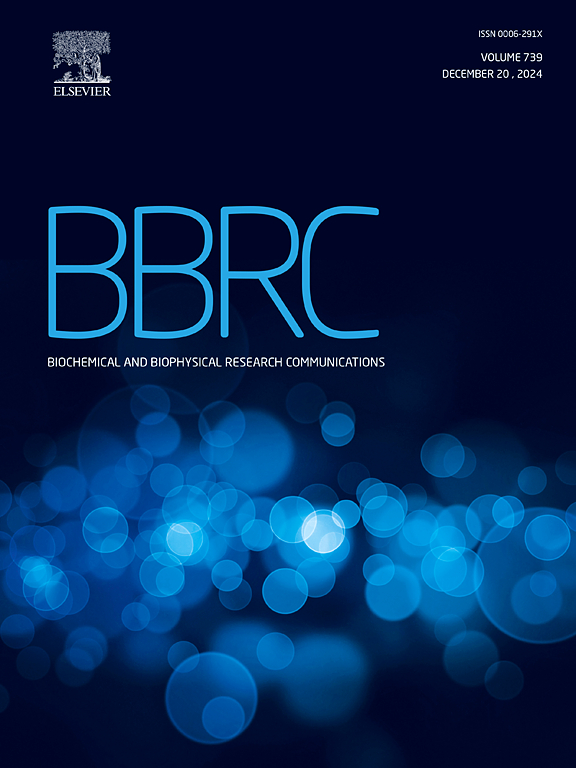ACSL1 能积极调节成脂分化。
IF 2.5
3区 生物学
Q3 BIOCHEMISTRY & MOLECULAR BIOLOGY
Biochemical and biophysical research communications
Pub Date : 2024-10-21
DOI:10.1016/j.bbrc.2024.150865
引用次数: 0
摘要
脂肪分化异常与肥胖及相关代谢性疾病密切相关。阐明驱动脂肪生成的关键因素是确定治疗以肥胖为代表的代谢性疾病的新型治疗靶点的有效策略。本研究采用转录组学技术研究了调控 OP9 细胞和 3T3-L1 细胞脂肪分化的功能基因。研究结果表明,在整个成脂分化过程中,Acsl1的表达明显上调。敲除 Acsl1 会导致与脂肪生成相关的基因表达减少,甘油三酯积累减少。此外,Acsl1的过表达促进了脂肪细胞的分化,而Acsl1的脂肪特异性过表达明显加重了高脂饮食诱导的脂肪变性。从机制上看,Cyp2f2、Dusp23和Gstm2是Acsl1诱导脂肪分化的关键基因。这项研究结果表明,Acsl1能促进脂肪生成,可作为治疗肥胖症及相关代谢疾病的潜在治疗靶点。本文章由计算机程序翻译,如有差异,请以英文原文为准。
ACSL1 positively regulates adipogenic differentiation
Aberrant adipogenic differentiation is strongly associated with obesity and related metabolic diseases. Elucidating the key factors driving adipogenesis is an effective strategy for identifying novel therapeutic targets for treating metabolic diseases represented by obesity. In this study, transcriptomic techniques were employed to investigate the functional genes that regulate adipogenic differentiation in OP9 cells and 3T3-L1 cells. The findings indicated a notable upregulation of Acsl1 expression throughout the adipogenic differentiation process. Knocking down Acsl1 led to a decrease in the expression of genes associated with adipogenesis and a reduction in triglyceride accumulation. Additionally, Acsl1 overexpression promoted adipocyte differentiation and adipose-specific overexpression of Acsl1 markedly aggravated steatosis induced by a high-fat diet. Mechanistically, Cyp2f2, Dusp23 and Gstm2 are the crucial genes implicated in Acsl1-induced adipogenic differentiation. The findings of this study indicate that Acsl1 promotes adipogenesis and could serve as a potential therapeutic target for treating obesity and related metabolic disorders.
求助全文
通过发布文献求助,成功后即可免费获取论文全文。
去求助
来源期刊
CiteScore
6.10
自引率
0.00%
发文量
1400
审稿时长
14 days
期刊介绍:
Biochemical and Biophysical Research Communications is the premier international journal devoted to the very rapid dissemination of timely and significant experimental results in diverse fields of biological research. The development of the "Breakthroughs and Views" section brings the minireview format to the journal, and issues often contain collections of special interest manuscripts. BBRC is published weekly (52 issues/year).Research Areas now include: Biochemistry; biophysics; cell biology; developmental biology; immunology
; molecular biology; neurobiology; plant biology and proteomics

 求助内容:
求助内容: 应助结果提醒方式:
应助结果提醒方式:


